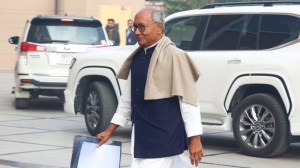Not total recall
Residents of three nagar palikas in Chhattisgarh are part of a notable political experiment: the presidents of their...

Residents of three nagar palikas in Chhattisgarh are part of a notable political experiment: the presidents of their municipalities are being subjected to a right to recall provision. The 1992 Nagarpalika Act at the Centre provided a list of powers to municipalities; all states subsequently modified their laws to eliminate any inconsistencies. Chhattisgarh, keeping in mind the purpose of the original legislation 8212; to make local government as directly accountable to residents as possible 8212; also incorporated the provision under which these officials may lose their jobs. The clause was tripped when three-fourths of corporators wrote to their district collector recommending recall.
Meanwhile, Somnath Chatterjee was quoted as saying that he felt a 8220;right to recall8221; MPs and MLAs would be helpful in dealing with their 8220;misbehaviour8221;. Chatterjee8217;s goal is not in doubt. But as before, his means seem ripe for scrutiny. There are good reasons to be more than a little circumspect about recall petitions at higher levels of the legislative system. In the United States, 18 states permit the recall of state officials, but the criteria are mostly so difficult to fulfil that state governors have only been recalled twice. Thirty-six American states, however, have legislation allowing for the recall of officials at local levels, which are used reasonably often; in Germany, every executive mayor is subject to recall.
Not only is the direct democracy of recall more effective for the smaller scale of local or municipal politics, where it can be decided on 8212; usually 8212; a single clearly-defined issue with which the local population is already engaged, but the history of the right to recall at higher levels is discouraging as well. The chaotic 2003 process that resulted in the replacement of California8217;s governor, Gray Davis, by Arnold Schwarzenegger was actually remarkably restrained; earlier, such tries have featured subversion by special interests and can create a state of permanent electioneering. On the other hand, if the process is made more difficult at higher levels, it can become useless: the only major constitution that guaranteed the right to recall a national-level official was that of Weimar Germany in the 8217;20s, where it clearly did not work.
- 01
- 02
- 03
- 04
- 05































